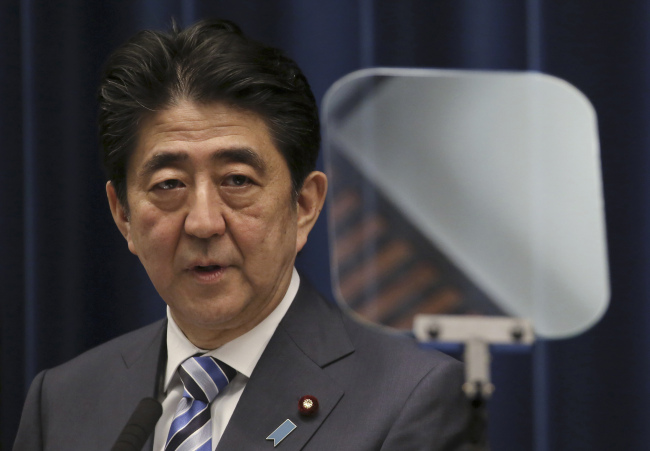Korea-Japan tension escalates ahead of Abe’s key speeches
By Shin Hyon-heePublished : April 21, 2015 - 20:46
Tension is escalating between Seoul and Tokyo as Japanese Premier Shinzo Abe indicated he will not repeat past apologies for wartime atrocities in an upcoming statement marking the end of World War II, while sending an offering to a controversial war shrine.
Seoul on Tuesday strongly condemned the ritual donations by Abe and a series of other cabinet ministers and top politicians to the Yasukuni Shrine to commemorate a spring festival. Since his visit to the shrine in December 2013, which enraged Korea and China and invited criticism from other countries, he has instead sent the “masakaki” tree for the event, which is held every April and October.
The temple venerates some 2.5 million Japanese war dead including 14 “Class A” World War II criminals, such as Gen. Hideki Tojo, who orchestrated the 1941 attack on Pearl Harbor.
Seoul on Tuesday strongly condemned the ritual donations by Abe and a series of other cabinet ministers and top politicians to the Yasukuni Shrine to commemorate a spring festival. Since his visit to the shrine in December 2013, which enraged Korea and China and invited criticism from other countries, he has instead sent the “masakaki” tree for the event, which is held every April and October.
The temple venerates some 2.5 million Japanese war dead including 14 “Class A” World War II criminals, such as Gen. Hideki Tojo, who orchestrated the 1941 attack on Pearl Harbor.

Late Monday, Abe signaled he will not reiterate previous official apologies for Japan’s sex slavery and other wartime wrongdoing in a highly anticipated statement to mark the 70th anniversary of the end of the Pacific War.
In an interview with a local broadcaster, Abe said he did not see the need to reiterate past apologies, such as the one issued in August 1995 by then Prime Minister Tomiichi Murayama, since he has expressed his willingness to uphold the “basic thinking” behind them.
“There is no need for a new statement if it were to be the same,” he told BS-Fuji television.
While blasting the premier’s contribution, Seoul’s Foreign Ministry warned him against “missing his good chance of clearly declaring the Japanese government’s historical view to neighboring countries and the international community.
“Japan’s political leaders must recognize that their display of respect and gratitude for such a shrine represents their denial of the premise on which Japan was able to return to the international community following the war, as well as of the post-war international order,” ministry spokesperson Noh Kwang-il said at a news briefing.
Calls are increasing around the world for Abe to facilitate a thaw with neighbors by sincerely atoning for the country’s imperial past ahead of key addresses including an Asia-Africa summit Wednesday in Indonesia, where Korean Deputy Premier Hwang Woo-yea and Chinese President Xi Jinping will also take part. Abe is also due to speak at a joint session of U.S. Congress in Washington next week.
Speculation is mounting that the forthcoming text will not contain an explicit apology and terms such as “aggression” and “colonial rule,” given Abe’s apparent attempts to dilute Japan’s history and his strong revisionist belief.
“(Abe) has publicly expressed remorse for the war and said he will honor Japan’s past apologies for its aggression, including the sex slavery. Yet he has added vague qualifiers to his comments, creating suspicions that he doesn’t take the apologies seriously and will try to water them down,” the New York Times said in an op-ed Monday.
“But Japan cannot credibly fill that broader role if it seeks to repudiate criticism of its past.”
The Washington Post also pointed out that though the nationalist premier has publicly shown remorse over the war and said he will embrace the 1995 statement “in general” or “in its entirety,” he has refused to be drawn out on whether he will repeat the two keywords.
“But making only a cursory reference to historical issues ― particularly the Japanese army’s use of Korean and Chinese women as sex slaves at ‘comfort stations’ ― will further inflame tensions in East Asia in this pivotal year,” the newspaper said.
By Shin Hyon-hee (heeshin@heraldcorp.com)


![[Herald Interview] 'Amid aging population, Korea to invite more young professionals from overseas'](http://res.heraldm.com/phpwas/restmb_idxmake.php?idx=644&simg=/content/image/2024/04/24/20240424050844_0.jpg&u=20240424200058)













![[KH Explains] Korean shipbuilding stocks rally: Real growth or bubble?](http://res.heraldm.com/phpwas/restmb_idxmake.php?idx=652&simg=/content/image/2024/04/25/20240425050656_0.jpg&u=)

